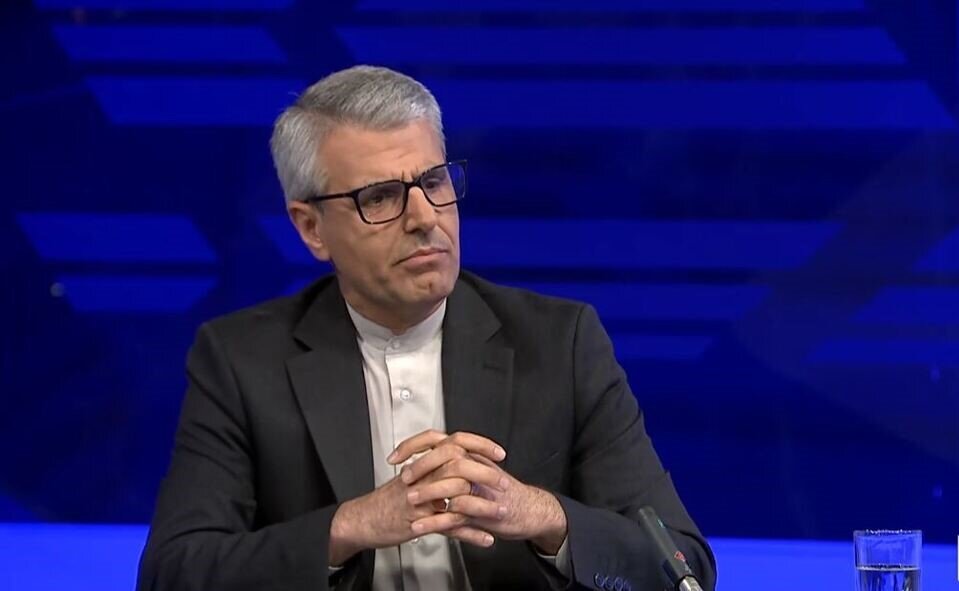Tehran says European snapback threats ‘unprofessional’ and ‘desperate’

TEHRAN – In a televised interview on Tuesday, Iranian Foreign Ministry Spokesman Esmaeil Baqaei delivered a scathing critique of European powers’ renewed push to invoke the UN sanctions “snapback” mechanism against Tehran.
Dismissing the move as “unprofessional and born of desperation,” Baqaei said Europe’s actions reveal its fundamental unreliability as a diplomatic partner.
“European countries have turned snapback into a cudgel for months—a tool reflecting their incapacity for constructive engagement,” he stated, emphasizing that Iran “will never concede to extortion” over what he termed baseless allegations.
Baqaei’s remarks come as the International Atomic Energy Agency (IAEA) Board of Governors convenes for its seasonal meeting, which began on Monday and is set to conclude on Friday.
During the session, the United States and the E3—France, Germany, and the United Kingdom—are once again spearheading a politically motivated campaign to censure Iran, relying on unverified allegations presented in the IAEA’s latest report.
The report, cited by Director General Rafael Grossi, fixates on traces of uranium particles at three undeclared sites, claims Iran attributes to “sabotage” and politically motivated intelligence from the Israeli regime.
In his remarks to national TV, Baqaei dismissed the allegations as “excavations of the past from 25 years ago,” designed solely to fabricate pretexts for referral to the UN Security Council.
The Foreign Ministry spokesman’s rebuke aligns with a groundbreaking statement issued Tuesday by Iran’s Intelligence Ministry.
The ministry disclosed it had obtained documents exposing “illegal and covert nuclear weapons programs” run by Tel Aviv, detailing its facilities, research, and collaborations with the U.S. and European institutions.
“These papers irrefutably show how the U.S. and certain European nations have acted as backers, collaborators, and contractors in advancing the criminal Zionist regime’s nuclear arms programs,” the ministry declared.
"Yet, through double standards and baseless accusations, they attempt to portray Iran—a transparent state fully compliant with the Treaty on the Non-Proliferation of Nuclear Weapons (NPT)—as engaged in non-peaceful pursuits."
Furthermore, in his interview, Baqaei underscored that supposed Western anxieties about Iran’s program stem not from factual evidence but from “malicious concerns driven by Israel.”
The Iranian spokesman noted, “Since 1984, for 40 years, allegations about Iran’s nuclear ambitions have originated in Israeli media. The IAEA’s own reports confirm the peaceful nature of our activities.”
Baqaei reiterated Europe’s history of capitulating to U.S. pressure, recalling its failure to shield Iran from sanctions after Washington unilaterally abandoned the 2015 Joint Comprehensive Plan of Action (JCPOA) in 2018.
“Europe could not fulfill its obligations post-U.S. withdrawal,” he noted.
Not only did Europe fail to defend Iran from sweeping sanctions, but its ill-fated promise to establish an alternative financial mechanism to facilitate non-USD and non-SWIFT transactions with Iran, often referenced as the Instrument in Support of Trade Exchanges (INSTEX) initiative, further underscored its shortcomings.
By choosing to align with U.S. policy instead of honoring the JCPOA commitments, European policymakers deepened the sanctions’ impact and undermined any meaningful efforts toward a constructive diplomatic dialogue with Tehran.
Moreover, Baqaei added that the E3’s potential referral of Iran to the Security Council required “no snapback pretext—just the political will to appease the U.S. and Israel.”
The E3’s current threat to trigger snapback—a mechanism expiring in October—aims to reinstate all pre-JCPOA UN sanctions, including an arms embargo and bans on uranium enrichment.
Baqaei warned this would backfire: “If snapback is invoked, Europe’s role in the JCPOA ends, and tensions could escalate irreversibly.”
Despite Europe’s “destructive conduct,” Baqaei emphasized Iran’s continued diplomatic outreach, including canceled talks with E3 foreign ministers.
“We remain ready for dialogue because the JCPOA is still alive, and they are party to it,” he said, contrasting Tehran’s “responsible approach” with Europe’s subservience to Washington.
Notably, the U.S. has sidelined the E3 in recent negotiations, holding five rounds of indirect talks with Iran via Oman—all stalled over Washington’s demand for “zero enrichment” on Iranian soil, a red line Tehran calls “excessive and outrageous.”
‘Grossi has not acted constructively’
Additionally, Baqaei reserved sharp criticism for IAEA Director General Rafael Grossi, asserting that he has abandoned technical neutrality to serve Western geopolitical agendas.
“Grossi has not acted constructively. His interviews and statements align with countries that have chosen confrontation with Iran,” he said, citing Grossi’s recent remarks suggesting Iran might quit the NPT if attacked.
Baqaei described this narrative as a “distraction,” stressing that Iran’s nuclear program “has never deviated from peaceful purposes.”
The IAEA director’s recent behavior suggests a possible coordination between the nuclear watchdog and anti-Iran elements, particularly given IAEA Director Rafael Grossi’s well-known ambition to secure the position of UN Secretary-General.
Sources speaking to the Tehran Times say that Iran has come across confidential letters it previously sent to the IAEA, alongside other classified UN nuclear watchdog documents related to its program, among the latest Israeli documents it obtained.
One insider said Tehran believes the Israeli regime didn’t steal these materials via espionage but obtained them directly from the IAEA.
Baqaei also highlighted disproportionate scrutiny of Iran compared to other nations: “Of 682 inspections conducted across 32 countries voluntarily implementing the Additional Protocol, 493 were in Iran.”
He attributed this imbalance to E3 and U.S. dominance within the IAEA Board of Governors, where their “votes and composition enable resolutions against us.”
While condemning Western pressure, Baqaei confirmed Tehran will soon submit a “logical and balanced” counter-proposal to the U.S., insisting any agreement must guarantee verifiable sanctions relief and normalized trade.
Leave a Comment